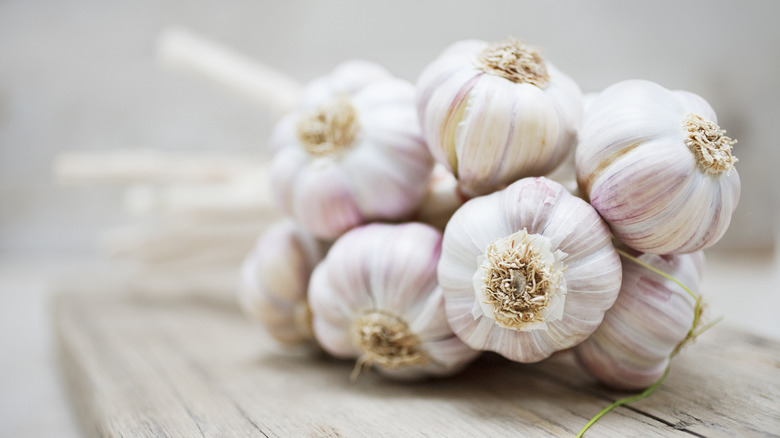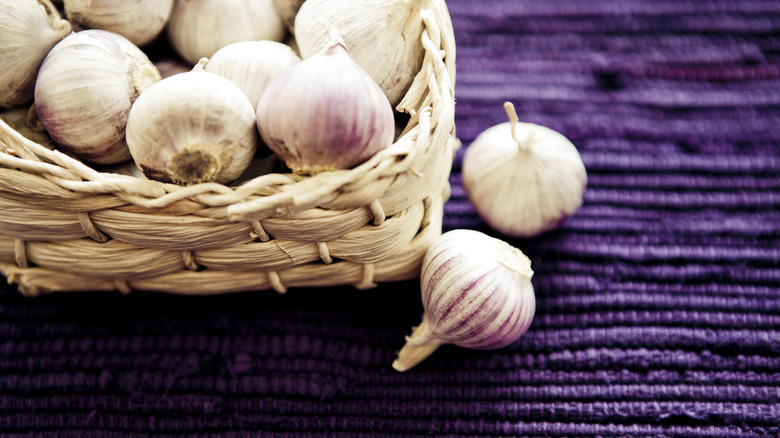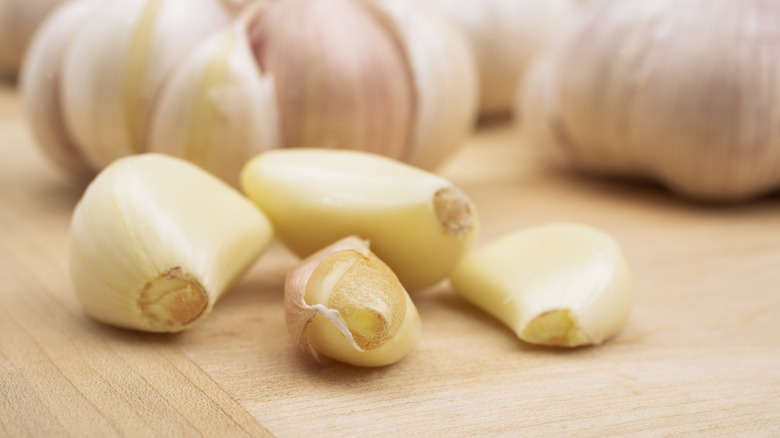The Reason You Should Avoid Refrigerating Garlic
Whether you're making a classic garlic aioli or adding it to pasta sauce, keeping fresh garlic in your kitchen ensures your dishes deliver on flavor. However, proper storage is key to ensuring that garlic remains flavorful and aromatic for as long as possible. In that case, avoid storing garlic in your refrigerator, as cold storage can result in a few unwanted effects.
Going from room temperature to a chilly environment like the refrigerator can affect the taste of garlic cloves. As a result, you may detect an acrid, unpalatable flavor. Garlic kept in the refrigerator is also likely to sprout faster than it normally would. When garlic is subject to certain conditions, such as humidity, it will begin to grow new shoots.
Keep in mind that refrigerators often have humidity levels ranging from 30% to 50%, but humidity can increase depending on the temperature of food when it's placed in the appliance. While garlic shoots aren't hazardous to your health, they do contribute to an unappetizing flavor. Fortunately, proper storage of garlic keeps it tasty and stops it from sprouting prematurely.
Best practices when storing garlic in your kitchen
When seeking the best possible place to keep garlic in your kitchen, you want to aim for cool, dry conditions. The preferred temperature range for garlic storage is between 60 F and 65 F, and it should also be protected from high humidity levels. Airflow is another important factor when storing garlic. That means the best place for the vegetable is a dry, cool, and airy part of your kitchen.
Even if you find the perfect location, the choice of storage container can cause issues. For example, a sealed container impedes circulation and can increase the rate of spoilage. As a result, mesh bags are an ideal storage medium, as they allow air to flow over garlic and prevent condensation from forming. If you don't have a mesh bag, no worries, as storage mediums like paper bags or even baskets also work well. Paper bag storage is also great for onions, as it won't trap moisture like a plastic bag or container might. If you take the right storage steps, your fresh garlic should remain tasty for quite some time.
How long will fresh garlic last?
The lifespan of fresh garlic typically depends on whether it's been peeled. When an unpeeled garlic head is kept in optimal conditions (meaning a cool, dry area with ample airflow), it can remain palatable for up to six months. When it comes to an unpeeled clove of garlic, you usually have approximately three weeks before spoilage becomes an issue. Peeled garlic has a much shorter shelf life and should be incorporated into recipes within a week of peeling.
It also helps to know the signs of garlic spoilage, which can prevent you from using a bad clove or bulb in a meal. A soft texture and discoloration signal that garlic has gone bad or may even be harboring mold. Bad garlic usually takes on a brown hue and may feel mushy when pressure is applied. Ideally, garlic should maintain a firm texture and should have a uniform white or off-white color. When you take the right approach, fresh garlic can last a long time and be your constant companion in the kitchen.


